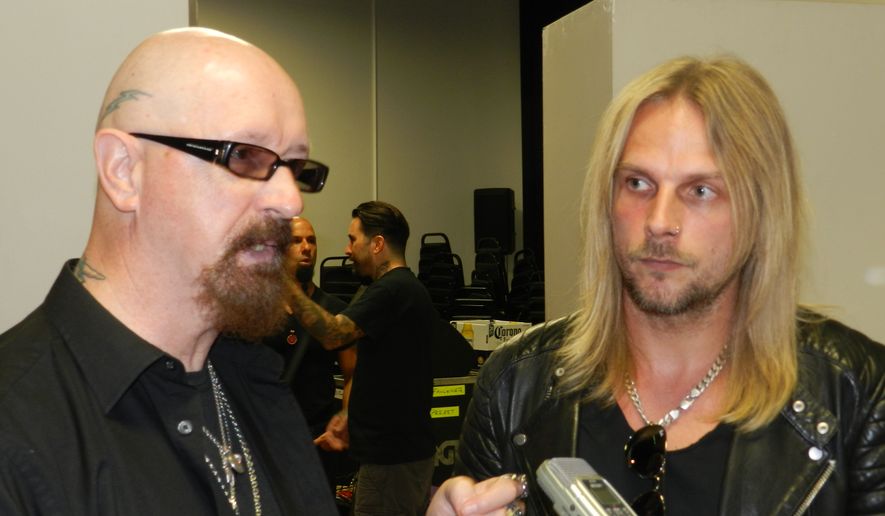No other band in history has defined the term “heavy metal” better than England’s Judas Priest. Both in sound (wailing vocals and dual guitars) and style (leather and studs, dark imagery and yet more leather and studs) they came to create, define and take the genre to the masses.
Led by charismatic singer Rob Halford aka “The Metal God,” the band wrote stadium-shaking anthems like “Breaking the Law,” “Living After Midnight” and “You’ve Got Another Thing Coming.” In their nearly half-century career, the band has sold over 45 million records and rocked several generations of fans worldwide.
Mr. Halford and “new guy” guitarist Richie Faulkner — who joined in 2011 — at Rock and Roll Fantasy Camp in Los Angeles to talk about sobriety, longevity and the future of Judas Priest.
Question: What made you get involved with Rock and Roll Fantasy Camp?
Rob Halford: For us it’s bigger than the music. It is very much an experience that brings a lot of skills and discoveries about yourself together. In that respect, it also enables you to learn that being in a band is a lot tougher than sitting around and playing guitar in your bedroom. You really have to try and find a way to communicate, to respect each other’s opinions and ideas, to be able to fight for something you feel is better than somebody else’s idea.
It’s a lot of things other than the music. I think that’s the thing that draws us to it.
Q: What advice do you give young rockers?
Richie Faulkner: Practice. Listen. Use you ears. And as Rob said, that team effort. You can learn your instrument in your room, but being in a band is more than playing your instrument.
Listen to other people. Respect the other people in the band, and work together to create something that is larger than the sum of its parts. And have fun.
RH: You gotta have fun. Even now we have fun onstage.
RF: Too much sometimes.
RH: We can look at each other and say, “How cool is this?!” Also, never lose perspective on where you are and what you’ve got. And how you got it. Don’t put yourself on a pedestal. Because it’s very easy for someone to knock you off. It’s balance.
Q: What do you guys get out of being here?
RH: It’s making new friends, helping people realize something that could be very, very important to them. And also learning something about yourself as a musician. Because we are looking at these rock ‘n’ roll campers, and we know what is going on in their minds because we’ve been there.
RF: It’s also giving back to the community that put us all there in the first place. Priest wouldn’t be here without the support of the fans. As soon as I joined the band, I got it straight away. Especially in my situation, since I’ve only been here five minutes. I was a fan.
Q: Richie, when you joined, was there any trepidation because you were coming into an established act?
RF: There are challenges in life, and it was a great challenge to have. The situation I was getting into, I knew what it stood for to me and to millions of people around the world. You get an opportunity like that, a chance to audition, you’ve got to do it. It worked out.
Q: Do you remember you very first live show?
RF: I don’t remember it. I remember the second show. You have an idea in your mind of how the first show will be. Since I was 15 years old in front of the mirror saying, “If I was in Priest, this is what I would do.” But in truth, I don’t remember any of it.
The second show there was a point where I stood back. We had a 40-foot ramp that went out into the crowd. Rob came out on the bike. It was raining. He drove the bike to the end of the ramp. I’m standing there looking at him. Rain coming down. Lights flashing. Blue smoke everywhere from the bike. He’s on the bike with his metal horns in the air, and there were 30,000 people in front of him screaming. I remember thinking, “This is real.”
Q: Rob, did you give him any advice when he joined?
RH: The only advice we gave him was we wanted Richie to be his own guy. You have to let your musicians in your band be who they are. Richie is very respectful to the songs that he plays from when [founding member] K.K. [Downing] was in the band. He plays them incredibly. And he’s got his own nuances and his own techniques that he puts in — as he should.
The last thing we wanted was a copycat. When we saw him play, we thought, “We don’t have to tell this guy anything. He’s got it.”
Q: Rob, what part has sobriety played in your longevity?
RH: Without it? Oh, I’d be dead. Literally, I would be dead. I wouldn’t be talking to The Washington Times now. I wouldn’t be here.
The place where I got to, the next step, was lost. I love people. I love being in a band. I love making music. I had to figure out that was way more important than being addicted.
Q: What is next for Judas Priest?
RF: We’re writing a new record this year. As we speak, really. We have already had a writing session in England earlier this year. We have another one coming up later this year. The focus is on a new record.
RH: Then road work to support the record. That’s the life really isn’t it? You write. You record. You play. And it never grows old.
The future looks great.




Please read our comment policy before commenting.